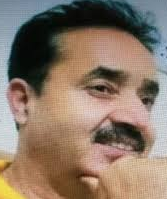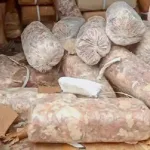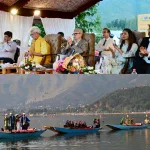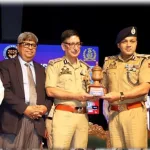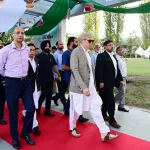INDIA STANDS UNITED
The blood-soaked meadows of Pahalgam bore silent witness to a massacre that shook the conscience of the nation. What was once a peaceful summer retreat nestled in the lap of Kashmir’s mountains became the site of a carnage that defied humanity. Over thirty innocent lives—men, women, and children, many of them domestic tourists—were extinguished in a burst of gunfire. The target was not military. It was not even political in the conventional sense. It was symbolic. It was an attack on India’s soft power, its democratic ethos, and its growing confidence in restoring normalcy to the conflict-scarred valley.
In the face of such a tragedy, routine statements and ritual condemnations could not suffice. Something greater was demanded. Something more solemn, more representative of India’s soul. And it was in this moment of reckoning that the Government of India chose to send an all-party parliamentary delegation to several countries, not merely to register protest or seek sympathy, but to reaffirm India’s unwavering perspective on terrorism. It was a move layered in political wisdom and national emotion—an act that would transform grief into global engagement.
This was not diplomacy in its narrowest sense. This was diplomacy broadened by collective will. By including members from across the political spectrum—from the ruling establishment to its most vocal critics—the message was clear: terrorism is not a matter of domestic politics. It is an assault on the very fabric of civilization, and the response must be as united as the attack was divisive.
For decades, India’s diplomatic engagement on terrorism had been largely confined to formal channels and government emissaries. Statements were issued, dossiers exchanged, and pressure diplomatically mounted. But this time, India went beyond protocol. It reached out through the voice of Parliament itself. The symbolism was profound. Parliamentarians represent the people. They carry not just policy, but popular sentiment. Their journey to global capitals—Washington, London, Berlin, Brussels, Tokyo, and key Gulf countries—was not one of protest but of persuasion. It was about reclaiming India’s narrative on terrorism, long distorted or diluted by external lenses and geopolitical compulsions.
The post-Pahalgam initiative was also a strategic correction. For years, the world has viewed the Kashmir issue through an imbalanced perspective, often equating terrorism with political dissent, or worse, justifying violence as the expression of local grievances. The massacre exposed the hollowness of that narrative. These were not freedom fighters. These were cold-blooded terrorists. Their bullets did not ask about the religion, language, or ideology of the victims. They simply annihilated. The delegation, armed with testimonies, photographs, and irrefutable evidence, presented the case with moral clarity—this was not a localized insurgency; this was cross-border terrorism masquerading as resistance.
In foreign halls of power, the delegation carried something no diplomat could replicate—a unity of voice across party lines. In a time where polarization defines politics in many parts of the world, India showed that when the soul of the nation is wounded, Parliament does not fragment; it fuses. And that fusion became the greatest strength of India’s global message. This was not one government speaking. It was one nation grieving, one democracy asserting its dignity.
The move also reflected an evolution in India’s diplomatic strategy—from reactive to proactive. Rather than waiting for the global conscience to stir, India stirred it itself. The delegation didn’t simply seek condemnation. It sought understanding. It placed terrorism within the context of a larger civilizational crisis. It challenged the moral relativism that often surrounds discussions of violence in South Asia. It reminded the world that terrorism, no matter what cloak it wears—religious, political, or ideological—is an act against humanity.
There was also a psychological component to this initiative. In moments of national trauma, it is not just the people who need healing, but also the image of the nation itself. The all-party delegation, in representing a shared anguish, became a vessel for that catharsis. It signaled to the international community that India’s democracy, for all its debates and divisions, becomes indivisible in the face of terror. That image, more than any official communiqué, left a lasting impression abroad.
Another critical aim of the delegation was to counter the propaganda machinery of Pakistan, which continues to operate with calculated denial. For years, Pakistan has sustained a narrative in certain international circles that obfuscates its role in exporting terror across the Line of Control. Through its media outreach and diplomatic engagement, Pakistan has often tried to shift the blame or reduce terrorism in Kashmir to a human rights issue. But the all-party delegation dismantled this pretense. With evidence, context, and unison, it exposed the ecosystem that allows such massacres to occur. It challenged the world to stop treating terrorism with strategic amnesia.
The initiative also reconnected with an often-underutilized resource—the Indian diaspora. Across continents, the diaspora serves not only as an economic force but as a soft power pillar. By engaging with these communities, the delegation ignited a transnational dialogue. Diaspora leaders, scholars, and professionals were urged to amplify the truth—to become storytellers in boardrooms, classrooms, and parliaments, where policies are shaped and opinions forged.
Domestically too, the delegation played an equally powerful role. In Kashmir, where trust is fragile and narratives often contested, the presence of not just central leaders but opposition voices helped convey a vital message: the response to the massacre was not punitive but principled. It was not a crackdown; it was a collective cry for peace. Such gestures matter deeply in regions where wounds run deep and histories are politicized. They bring nuance to national policy and restore dignity to public discourse.
What the delegation ultimately signified was that democracy is not weak in the face of terror—it is resolute. By walking together into foreign parliaments and international fora, India’s political leaders redefined patriotism. They proved that standing together does not mean silencing dissent, but harmonizing it when the nation’s integrity is at stake.
This initiative marked a shift in India’s moral posture. Instead of seeking validation, it demanded introspection from the world. Instead of playing the victim, India emerged as a protagonist in the global fight against terror. It reminded powerful nations that their selective sympathies, guided by interests rather than ethics, cannot continue unchecked. When innocent lives are reduced to diplomatic footnotes, the very essence of international law and human rights is betrayed.
And yet, the delegation was not merely an act of image-building or political performance. It was, in many ways, a reassertion of India’s identity as a civilizational democracy—where politics is not only about governance but about shared grief and collective strength. When a country of such diversity can find unity in tragedy, it demonstrates that the true spirit of the republic lies in its ability to transcend itself when it matters most.
As the delegation returned, it brought with it more than resolutions or reassurances. It brought recognition. It brought the beginning of a shift. And above all, it brought back to India a reaffirmation of its own belief—that terror may target lives, but it cannot destroy the moral center of a nation determined to stand together.
In the memory of those who died in Pahalgam, in the silence that now hangs over the pine-covered hills of that wounded town, this delegation wrote a different kind of obituary—not one of despair, but of resolve. The world was told, and it heard: when India bleeds, its Parliament rises—not as a house divided, but as a voice united. That voice, carried across oceans and continents, is now part of the global conscience. And it will echo every time truth is threatened by terror.
(Author is RK Columnist and can be reached at: [email protected])


